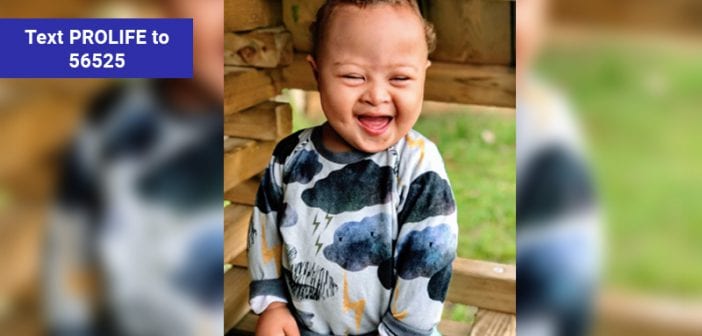In 2016, Sarah Ojar and her husband were expecting their second child. The couple, living in London, learned early that there were signs their son might have Down syndrome. In a post about their story on Love What Matters, Ojar wrote that the parents had already determined that they would not kill a child through abortion no matter the diagnosis. Despite this certainty that they would choose Life, they were repeatedly told to end their son’s life.
The pressure to choose death began early. When at 12 weeks Ojar and her husband learned that there was a 1/29 chance that their child had Trisomy 21 (Down syndrome), they were told they could opt for abortion. Later, when their son developed fetal hydrops, a condition in which fluid collects in different parts of the body, doctors urged them to choose abortion. Ojar writes, “They said, ‘He really has no chance of surviving,’” as if this were a valid reason to violently kill an innocent preborn child with a beating heart.
At every stage, Ojar and her husband chose Life for their son, whom they named Zephy. Ojar shares the challenges they faced, writing, “As a family, we went through a range of emotions from disbelief and denial, to anger and pain, and finally to acceptance and hope.” After the struggle, the family experienced profound peace. Ojar writes, “Our families were so supportive, and he was so loved and accepted from before he was even born.”
Click here to sign up for pro-life news alerts from LifeNews.com
Many families who receive a prenatal diagnosis of Down syndrome are told to end their child’s life in abortion. For families who do not have the encouragement and support that Zephy’s family had, abortion can seem like the only option.
This is intensified by the fact that most people do not know many people raising a child with Down syndrome and have no idea what to expect. Ojar was in this category. She explained, “At the time, we knew nothing about Down syndrome, other than it meant he had an extra chromosome and may have some developmental delays. We had no idea what raising a baby with additional needs would be like.” Ojar was fortunate that she knew of someone with experience who was able to guide her. She wrote, “We had one friend with a child with Down syndrome, who I reached out to during my pregnancy for advice and information, and she connected me to the right groups and support.”
Tellingly, the connection to life-saving support groups did not come from the doctors who had given Zephy a death sentence but from other parents Ojar had to find on her own. Those connections and support groups were hugely beneficial after Zephy’s birth when his family had to navigate the challenges of special needs associated with a condition like Down syndrome. In those groups, Ojar says, “We discovered an amazing community of families, just waiting to welcome us in and take us under their wings.”
Despite the dire predictions that Zephy would not live to birth, today he is four and thriving. Many physical and developmental achievements that the family thought might be a struggle, Zephy mastered without a problem. He was even signed to a modeling agency and was featured in a baby food advertisement and a Down syndrome awareness campaign.
His mother says watching Zephy grow “has been a blessing.” The family is looking forward to the future and seeing how he continues to thrive.
Ojar wanted to offer hope for other families faced with a prenatal diagnosis. She wrote, “For anyone who finds themselves in a similar situation or has a postnatal diagnosis, I want to encourage you. I want you to know there is a wonderful community out there waiting with open arms to help you navigate practically and emotionally.”
The more people know that such support and encouragement exist, the less they will be bullied into ending an innocent child’s life in abortion. On a final note of hope, Ojar wrote, “Life is nowhere near as scary as I thought it might be. In fact, it’s not scary at all. It’s full of joy, wonder, amazement, and love. Down syndrome is not something we specifically think about every day. It’s everywhere, like the air we breathe, but not something we continuously focus on. I’m so excited to see what his future holds.”
LifeNews Note: This originally appeared at Texas Right to Life.








